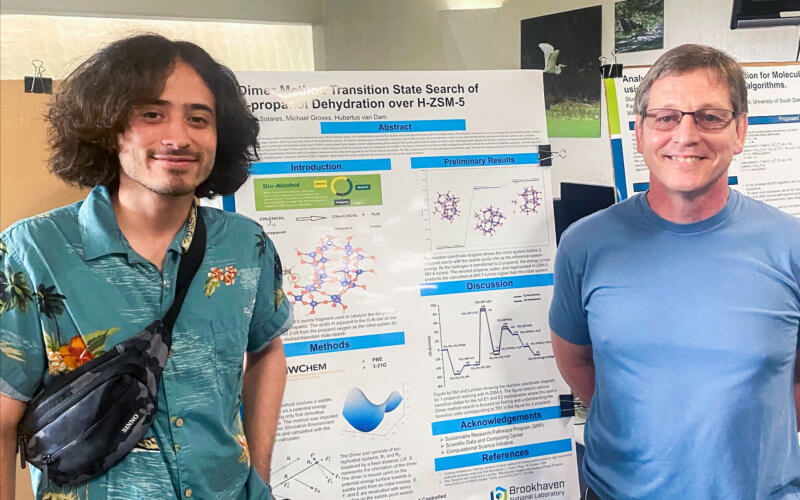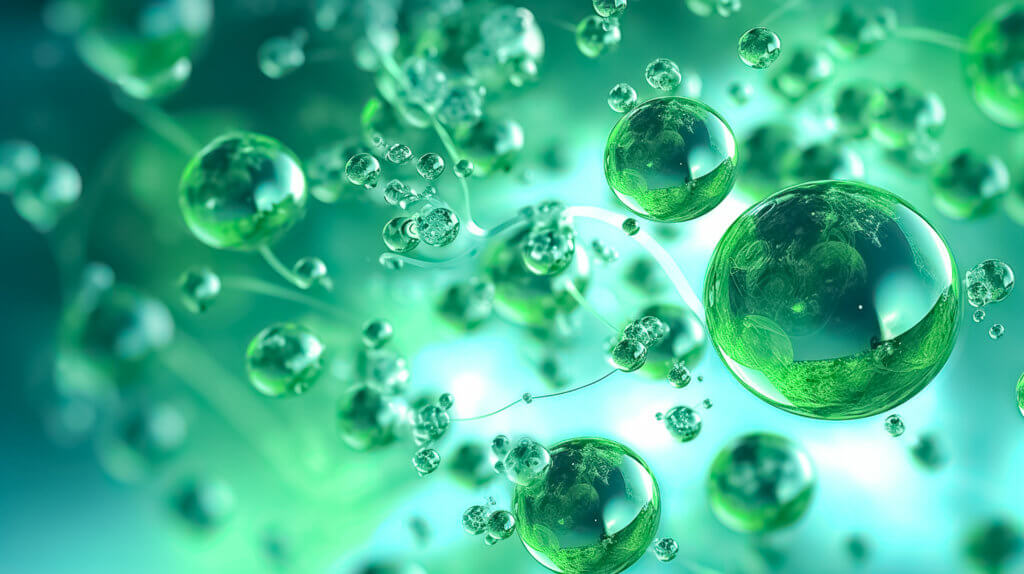
Chemistry graduate student Oliver Solares is working toward finding solutions for clean energy and mitigating the impacts of climate change.
During a summer internship to learn more about sustainable energy solutions, Solares worked on a research project to convert biomass waste into functional, usable hydrocarbon fuel at the U.S. Department of Energy’s Brookhaven National Laboratory on Long Island in New York.
Biomass waste refers to bioalcohols, which are naturally occurring alcohol molecules in nature. This research is part of the U.S. Department of Energy’s broader efforts to use high-performance supercomputing tools for modern applications, such as developing new materials for solar energy conversion or next-generation batteries.
Solares was selected to participate in the Sustainable Horizons Institute’s Sustainable Research Pathways Summer 2023 program. Through the workforce development program, underrepresented students are placed in national laboratories and work with scientists to encourage lasting collaborations, jump-start careers and build inclusive workplace environments.
Solares collaborated on research through the Computer Science Initiative at Brookhaven National Laboratory, which operates large-scale facilities for studies in physics, chemistry, biology, medicine, applied science and advanced technology. He delved into using computational skills he has learned by working in the lab of CSUF’s Michael Groves, associate professor of chemistry and biochemistry.
His research with Groves also deals with finding energy solutions. At CSUF, he focuses on phenol, a common industrial chemical that generates toxic waste. Groves and his students are researching cleaner, alternative ways of producing phenol, such as using a carbon-based catalyst. Solares is applying computational tools to have a better understanding of the properties of this catalyst and its potential as an industry material.

Solares, whose parents immigrated to the U.S. from Guatemala, is a first-generation college graduate. He transferred to CSUF from Fullerton College and earned a bachelor’s degree in chemistry in 2022. After completing his master’s degree next year, Solares plans to pursue a doctorate in chemistry and a career at a U.S. Department of Energy laboratory.
Why is this research important and how does it tie into your CSUF project?
My research at Brookhaven National Lab falls under one of the Department of Energy’s primary missions to advance our understanding of nature and energy. My project examined a reaction that converts natural biomass waste into usable fuel using a manufactured catalyst. My national lab and CSUF projects require a similar skill set, where I use a computer to model reactions, except for complex math calculations performed on Brookhaven’s and CSUF’s supercomputers. My experience in Dr. Groves’ lab made for a smooth transition to working at Brookhaven. Without the skills I have learned from Dr. Groves, my work at Brookhaven would not have been possible.
Why are you interested in biomass research?
The global biomass waste produced annually lies around 140 gigatons, making converting biomass into energy a top priority. My generation has the potential to stop the increasing amount of greenhouse gases in our atmosphere. This research was a tiny contribution to that potential, and I want to keep doing research that helps positively impact the planet. Additionally, this research is fascinating because supercomputers can accurately describe interactions happening at the atomic level. It’s truly remarkable that we can perform these computational models and learn so much about this process without needing the physical catalyst or waste.
What are the benefits of working with your CSUF faculty mentor?
Dr. Groves is an incredible mentor who constantly gives feedback on my research and writing and helps me prepare conference presentations. I owe him so much. He dedicates a generous amount of his time to helping all his students.
How did your work at the national lab empower your CSUF education?
Working at a national energy lab was the ideal summer experience for me as someone who wants to be a Department of Energy researcher. It was a once-in-a-lifetime opportunity to see firsthand what it’s like to work in a national lab with researchers.
How did this opportunity at Brookhaven advance your academic and career goals?
I wanted to get more research experience besides my work with Dr. Groves. It helped me determine if I see myself doing research as a career. This internship allowed me to make connections at a national lab and will give me a competitive edge on my applications to Ph.D. programs. I now realize that I want to contribute to a more diverse field of chemistry — and I want other first-generation, underrepresented students to know that we are just as capable of doing revolutionary scientific research.